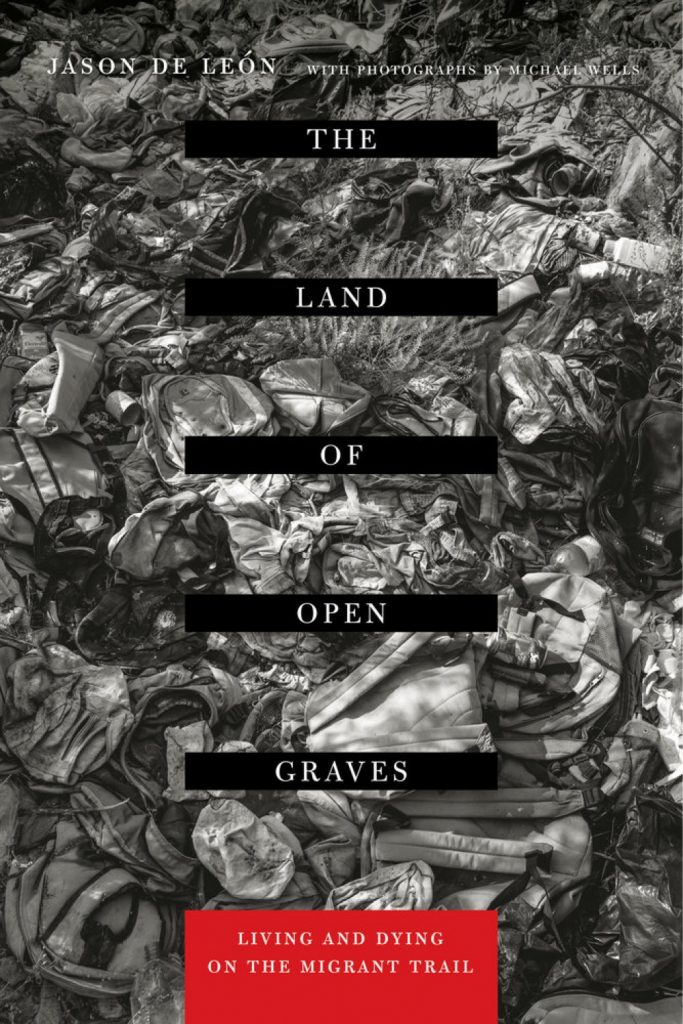Science, especially social science, is rarely apolitical. Nonetheless, researchers are often hesitant to engage with the political implications of their work. Striving to protect their objective, scientific stance, they leave the discussing and at times the fighting to the politicians and legislators.
University of Michigan anthropologist Jason de León is not one of those researchers. Politics is not merely implicated in his work, but rather drives it. De León studies undocumented migration between Mexico and the United States.

University of Michigan anthropologist Jason De León directs the Undocumented Migration Project.
As director of the Undocumented Migration Project, De León studies what happens to the bodies of migrants crossing the desert to reach the U.S. using “any genre I can steal from,” he told an audience at Duke University on April 5. Using tools from archeology, forensics, photography, and ethnography, de León and his team have been providing novel insights into one of the most urgent political challenges currently facing the nation.
De León acknowledged the political reality of his work immediately by opening his talk with a quote from President Trump about building a “great wall.” However, he was quick to clarify that the problem of missing migrants is not partisan. Rather, it has a long history that he argues started with the 1993 immigration enforcement policy, “Prevention through Deterrence.” This policy’s aim was to redirect illegal immigration to the desert rather than to stop it. Politicians hoped that in the desert, where security is weak and the terrain treacherous, the natural terrain would serve as a border wall. Inherent in this policy is the assumption that migrant life is expandable.
In the wake of this policy, the human smuggling industry in northern Mexico experienced a swift influx and the number of known migrant deaths began to rise. Since the 1990s, over 600 migrant bodies have been recovered from the Sonoran Desert of Arizona where de León conducts his research. Until his team conducted the first forensic experiments on the site, people could only speculate as to what was happening to the bodies of missing loved ones hoping to make it across the border. Now, de León can offer some helpful if heartbreaking data.

De León examines the human consequences of U.S. immigration policy in his book, “The Land of Open Graves”
De León’s archeological method, “desert taphonomy,” examines both the natural and cultural processes that determine what happens to a dead body. Anthropologists studying the body’s decomposition were initially interested only in natural factors like the climate and scavenging animals. Recently, they have realized that the decomposition process is as social as it is natural, and that the beliefs and attitudes of the agents involved affect what happens to human remains. According to this definition, a federal policy that leaves dead bodies to decompose in the Arizona desert is taphonomy, and so is the constellation of social, economic, and political factors that drive people to risk their lives crossing a treacherous, scorching desert on foot.
Guided by this new approach, de León studies social indicators to trace the roots of missing bodies, such as “migrant stations” made up of personal belongings left behind by migrant groups, which he says can at times be too big to analyze. De León and his team document these remnants with the same respect they pay to any traditional archeological trail. Items that many would dismiss as trash, such as gendered items including clothes and hygiene products, can reveal much needed information about the makeup of the migrant groups crossing the desert.
De León argues that human decomposition is a form of political violence, caused by federal policies like Prevention through Deterrence. His passion for his research is clearly not driven by mere intellectual curiosity; he is driven by the immense human tragedy of migrant deaths. He regularly conducts searches for missing migrants that families reach out to him about as a desperate last measure. Even though the missing individuals are often unlikely to be found alive, de León hopes to assuage the trauma of “ambiguous loss,” wherein the lack of verification of death freezes the grief process and makes closure impossible for loved ones.
The multifaceted nature of de León’s work has allowed him to inspire change across diverse realms. He has been impactful not only in academia but also in the policy and public worlds. His book, “The Land of Open Graves,” is accessible and poetic. He has organized multiple art exhibitions that translate his research to educate and empower the public. Through the success of these installations, he has come to realize that exhibition work is “just as valuable as a journal article.”

“State of Exception.”
Hearing about the lives that de León has touched suggests that perhaps, all researchers should be unafraid to step outside of their labs to not only acknowledge but embrace the complex and critical political implications of their work.

